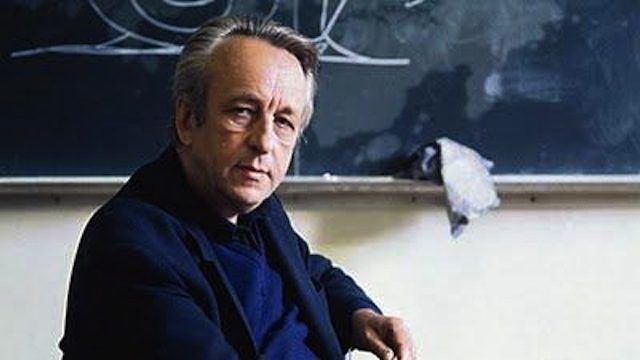As far as For Marx is concerned, this essay is by far the most developed chapter in the book. In it, Althusser answers many of the problems he has posed in earlier essays ("On the Young Marx", "Contradiction and Overdetermination", etc.), or at least poses those problems in a different and rather more solvable way.
"On the Materialist Dialectic" is an essay ostensibly about "theoretical practice". We are initially given an explanation of the meaning of this practice:
By practice in general I shall mean any process of transformation of a determinate given raw material into a determinate product, a transformation effected by a determinate human labour, using determinate means (of 'production'). In any practice thus conceived, the determinant moment (or element) is neither the raw material nor the product, but the practice in the narrow sense: the moment of the labour of transformation itself, which sets to work, in a specific structure, men, means and a technical method of utilizing the means. (131)Althusser goes on to say that the nature of a science's theoretical practice differs (via "epistemological break") in a rather radical, qualitative way, with that science's "ideological" prehistory (132). In other words, the constitution of a science is the constitution of a new problematic, not only with different terms but with different relations between the terms (hence there can be no simple inversion).
We come now to a crucial distinction:
- theory = any theoretical practice of a scientific character
- 'theory' = the determinate theoretical system of a real science (its basic concepts, in contradictory unity)
- Theory = "...general theory, that is, the Theory of practice in general, itself elaborated on the basis of the Theory of existing theoretical practices (of the sciences), which transforms into 'knowledges' (scientific truths) the ideological product of existing 'empirical' practices (the concrete activity of men). This theory is the materialist dialectic which is none other than dialectical materialism." (132)
The highly abstract nature of Althusser's undertaking should now be clear. The theory of theoretical production is a kind of meta-theory, here called Theory with a capital 'T'. This Theory, then, will subsume/explain/describe/theorize the individual 'theories' of given systems.
I am immediately inclined to ask the question of internality/externality: Does the "perspective" on these various theoretical systems or sciences change their intelligibility, the theoretical elaboration of their problematics? I would guess that Althusser, due to the prominence he accords to ideology, probably argues for an external perspective with regard to ideological problematics (this is what allows their critique). Perhaps the "scientific" nature of non-ideological problematics simply indicates the consistency of internal and "external" perspectives, or even their identity.
Althusser writes, regarding this question:
Althusser goes on to elaborate this Theory with the three "Generalities": Generality I is the abstract, Generality III is the concrete, and Generality II is the theoretical tool/toolset (a particular "theory") that transforms Generality I into Generality III.
I am immediately inclined to ask the question of internality/externality: Does the "perspective" on these various theoretical systems or sciences change their intelligibility, the theoretical elaboration of their problematics? I would guess that Althusser, due to the prominence he accords to ideology, probably argues for an external perspective with regard to ideological problematics (this is what allows their critique). Perhaps the "scientific" nature of non-ideological problematics simply indicates the consistency of internal and "external" perspectives, or even their identity.
Althusser writes, regarding this question:
The external application of a concept is never equivalent to a theoretical practice. The application changes nothing in the externally derived truth but its name, a re-baptism incapable of producing any real transformation of the truths that receive it. (134)By "external", Althusser means something slightly different than I have indicated above. Here, he means the taking of a concept from a theoretical practice and applying it to some field or object foreign (and incongruous) to it, i.e. a field or object in another theoretical practice, a different problematic. What remains to be elaborated is a theory of ideology that could account for the ideology-science divide and then relate that difference to the question of internality-externality. What we do get is a hint: "[A science's] particular labour consists of elaborating its own scientific facts through a critique of the ideological 'facts' elaborated by an earlier ideological theoretical practice" (148-149)
Althusser goes on to elaborate this Theory with the three "Generalities": Generality I is the abstract, Generality III is the concrete, and Generality II is the theoretical tool/toolset (a particular "theory") that transforms Generality I into Generality III.
Going along with this is Althusser's analysis of the abstract and the concrete. The supposedly concrete empirical object, existing as a separate and distinctly individuated element, is, Althusser says, actually highly abstract. What is concrete "in reality" is the totality; it is only as a result of a potent abstraction that a single commodity, for example, can appear as such in its isolation: "The simplest economic category...can only ever exist as the unilateral and abstraction relation of a pre-given, living concrete whole..." (Marx, Introduction to the Critique, qtd. 158). It is abstracted from that totality. But the three Generalities operate not in "reality" but in theory. Generality I is the abstract, i.e. isolated objects in thought. Generality III is concrete relative to Generality I, i.e. it has absorbed more determinations and been related to more things.
Althusser therefore provides an interesting critique of "abstraction":
Hegel's problem, consequently, is his erasure of Generality II as a contingent, externally-introduced system. For Hegel, Generality II is generated from Generality I, as its essence. Generality I cannot properly capture the essence of its object since it is so abstract; how then could Generality II be contained therein?Althusser therefore provides an interesting critique of "abstraction":
The act of abstraction whereby the pure essence is extracted from concrete individuals is an ideological myth. In essence, Generality I is inadequate to the essence of the objects from which abstraction should extract it. It is this inadequacy that theoretical practice reveals and removes by the transformation of Generality I into Generality III. So Generality I itself is rejection of the model from empiricist ideology presupposed by the "inversion". (156)
Althusser posits a strict difference between the concrete-in-thought and the concrete-in-reality (151). Rather confusingly, Althusser further posits the unproblematic correspondence between Generality III and the concrete-real that is its object. He seems to imply that the questioning of this correspondence is in some sense ideological, that it is not a proper question. I must admit that I am mystified by this, since Althusser himself seems to propose science/theory as model, implying the necessity of empirical (at least in some sense) correspondence. If science were not representational, of course, this would make perfect sense, and would actually place Althusser rather closer to my own understanding of problematics.
These considerations relating to the distinction of the real from thought leads Althusser to critique certain speculative commitments: "This speculative illusion had already been denounced by Feuerbach and it consists of the identification of thought and being, of the process of thought and the process of being, of the concrete 'in thought' and the 'real' concrete." (154) So we have the two confusing theses, that on the one hand the concrete-in-thought and the real-concrete do in fact correspond, and on the other hand that the two cannot be identified and that their processes of production cannot so correspond. Very interesting, albeit hard to understand.
In any case, contained in Althusser's vision is a hint as to the nature of conceptual work in which I am so interested. He provides us with two important facts (on 150): Generality I and III are never the same (presumably so long as Generality II is really heterogeneous to Generality I); and the whole process from I through II to III takes place within knowledge/is theoretical through and through. Is it then the case that the "combination" of two Generalities that are heterogeneous produces a third Generality that is itself necessarily heterogeneous to the first two? This seems reasonable, though still we have only vague (though practically effective) criteria for determining heterogeneity. Of course we must keep in mind that "external" application of concepts does no conceptual work, therefore much of it hinges on the internality of the process of theoretical production.
Finally, Althusser returns to the problem of overdetermination posed in "Contradiction and Overdetermination", now tied to the concept of "domination". While I will not get too deeply into this part of the essay, I will say a few things about it.
First of all, "Domination is not just an indifferent fact, it is a fact essential to the complexity itself. That is why complexity implies domination as one of its essentials: it is inscribed in its structure" (166). The totality is just such a structure in dominance (167). Contradictions are essential to this totality, and there can be no such totality without them. Hence these contradictions "constitute so many conditions of the existence of the complex whole itself" (170). Conditions of existence are equated with contradictions insofar as complexity is concerned; furthermore, everything is necessarily complex. Every contradiction must exist in such a whole. Even where mutual preconditioning is concerned, as in the base-superstructure distinction, one of these will dominate; this complex is overdetermination (171).
Summarizing this line of thought, Althusser writes:
Because each contradiction reflects in itself (in its specific relations of unevenness with the other contradictions, and in the relation of specific unevenness between its two aspects) the structure in dominance of the complex whole in which it exists, and therefore because of the current existence of this whole and therefore of its current 'conditions', the contradiction is identical with these conditions: so when we speak of the 'existing conditions' of the whole, we are speaking of its 'conditions of existence'. (173)Each particular condition thus reflects the whole in itself; overdetermination seems to imply a kind of holographic view of part and whole that is as complex as it is insightful. Overdetermination is a way to preserve dominance and contradiction alongside complexity. Presumably one would need to really see this in action to determine whether it in fact makes a good empirical analysis. It also reminds me that I need to go back and re-read some of Mao Zedong's philosophical works.
This will probably be the last post on For Marx. I will begin Reading Capital soon enough, and I will also in all likelihood also begin blogging my reading of Laruelle's Principles of Non-Philosophy.








